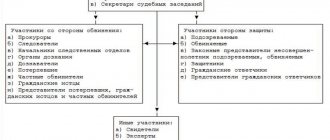In criminal proceedings, additional costs often arise. They are associated with different events and circumstances. The rules for their collection are enshrined in Art. 131, 132 of the Code of Criminal Procedure of the Russian Federation. The first norm establishes that compensation for costs is carried out from the budget or from the convicted person, depending on the outcome of the case. Art. 131 of the Code of Criminal Procedure of the Russian Federation (current version) establishes a list of costs. Let's take a closer look at them.
List of costs
It is secured by Part 2 of Art. 131 Code of Criminal Procedure of the Russian Federation. Procedural costs are amounts paid:
- Witness, victim and their legal representatives, translator, specialist, witnesses, expert, lawyer involved in the case by appointment of the investigator/inquirer or the court, to cover the costs associated with appearing at the place of investigative measures and accommodation. Such expenses include payment for rental accommodation, travel, and additional costs.
- To the victim to cover the costs associated with paying for the services of a representative.
- Witnesses who work and receive a permanent income, victims, their proxies, witnesses as compensation for the salary they did not receive for the period spent visiting the body of inquiry, investigation, court hearings or prosecutor.
- To persons without income for distraction from their usual occupation.
- As a remuneration paid to a translator, expert, specialist for fulfilling the duties assigned to them in the process of criminal proceedings. The exception is cases when these persons carried out their tasks in the course of their official activities.
- A lawyer for providing legal assistance if he is involved in proceedings by appointment of an authorized person.
- Persons for dismantling, forwarding, storing, transporting material evidence, transporting corpses, as well as their parts.
- Subjects carrying out forensic examination in specialized institutions.
- The accused, temporarily suspended from office according to the rules established by the first part of Article 114 of the Code. The amount is equal to the minimum subsistence level for able-bodied citizens established in Russia.
Art. 131 of the Code of Criminal Procedure provides for the possibility of compensation for other costs. In particular, such expenses may include amounts spent on notifying relatives or other close persons of the suspect about his detention and address. The amounts provided for in Art. 131 of the Code of Criminal Procedure of the Russian Federation, are paid on the basis of a resolution of an authorized officer or a court ruling. The amount and procedure for compensation of expenses, except for those specified in paragraphs 2 and 8 of the second part of the norm, are approved by the government.
Article 131 of the Code of Criminal Procedure of the Russian Federation. Procedural costs (current version)
1. Procedural costs can be defined as amounts of money, including compensation for necessary and justified expenses, lost income, as well as remuneration and payments that are due to be paid to individuals and legal entities involved in criminal proceedings as participants or otherwise involved in the decision facing him tasks.
Procedural costs should be distinguished from:
1) other material costs for criminal proceedings in the form of state expenses for the maintenance of bodies conducting criminal proceedings;
2) from expenses for compensation for damage caused by the crime;
3) from the costs of compensation for damage caused by unjustified criminal prosecution and illegal use of procedural coercive measures in the order of rehabilitation (see commentary to Chapter 18 of the Code of Criminal Procedure);
4) from the costs of compensation for damage that was unlawfully caused by the preliminary investigation bodies and the court, but not through the measures of procedural coercion established by Section IV of the Code of Criminal Procedure of the Russian Federation (in this case, the right to rehabilitation arises), but in another way (for example, through an unreasonably long detention as material evidence of property subject to rapid obsolescence and therefore lost in value).
At the same time, Art. Art. 131 and 132 of the Code of Criminal Procedure, as interpreted by the Constitutional Court of the Russian Federation, cannot serve as a basis for denying judicial protection to citizens and legal entities the right to reimbursement of expenses incurred in connection with the storage of material evidence in a criminal case.
———————————
See: Determination of the Constitutional Court of the Russian Federation of November 8, 2005 N 367-O “On the complaint of Marshall LLC about the violation of constitutional rights and freedoms by the provisions of Art. Art. 131 and 132 of the Code of Criminal Procedure of the Russian Federation” // Bulletin of the Constitutional Court of the Russian Federation. 2006. N 2.
2. The law distinguishes between the concepts of “compensation” and “collection” of procedural costs. For collection, see comment. to Art. 132. As a general rule, costs are reimbursed from the federal budget, i.e. the expenses of persons involved in the case are compensated by funds debited from special accounts of the bodies conducting the process. At the same time, the criminal procedural legislation enshrines the possibility of reimbursement of costs at the expense of participants in criminal proceedings. It appears that this possibility extends only to those participants who are parties and only if they consent to it. For example, at the request of a civil plaintiff, an examination can be carried out at his expense to determine the amount of material damage caused by the crime.
3. Among the types of costs, three groups of costs are distinguished: a) for the appearance of participants in the process; b) to compensate them for lost income or property; c) remuneration for fulfilling any instructions from the authorities conducting the case.
When interpreting the commented article, one should take into account a number of by-laws and judicial practice of applying the Code of Criminal Procedure of the RSFSR only to the extent that they do not contradict the Code of Criminal Procedure of the Russian Federation, current legislation in the field of labor and civil law: Resolution of the Plenum of the Armed Forces of the Russian Federation dated September 26, 1973 No. 8 ( as amended on February 6, 2007) “On judicial practice on the application of legislation on the collection of legal costs in criminal cases” (as amended by the Resolution of the Plenum of the Armed Forces of the Russian Federation dated December 21, 1993 N 11); Resolution of the Plenum of the USSR Supreme Court of March 18, 1963 No. 4 “On eliminating shortcomings in the practice of collecting legal costs in civil cases and legal costs in criminal cases” (as amended on November 30, 1990); Resolution of the Council of Ministers of the RSFSR dated July 14, 1990 N 245 “On approval of the Instruction on the procedure and amount of reimbursement of expenses and payment of remuneration to persons in connection with their summons to the bodies of inquiry, preliminary investigation, prosecutor’s office or court” (as amended on March 4 2003).
4. For distraction from regular activities, it is customary to pay one more daily allowance in addition to those daily allowances that are paid under clause 1, part 2, art. 131 of the Code of Criminal Procedure, in connection with appearance. If the regular daily earnings are less than the daily allowance, then it seems correct to pay the participant the daily allowance at the request of the participant in the process.
5. Remuneration paid to an expert, translator, specialist relates to procedural costs if these persons performed procedural duties not on official assignment. This means that the expert, translator and specialist are personally paid amounts upon conclusion of an agreement with them by the body conducting the criminal process. The contract establishes the amount and procedure for remuneration for the labor of a private expert, specialist and translator, depending on the “market” cost of this type of work in a given area. According to the contract or general rules of civil law, in case of poor performance of duties, the amount of payment may be reduced. If the criminal procedural responsibilities of an expert (when an examination is appointed in an expert institution. See commentary to Article 199), a specialist or a translator are simultaneously his labor (official) responsibilities, then procedural costs may include amounts paid to the employers of these persons ( paragraphs 7, 9, part 2, article 131, part 3, article 132 of the Code of Criminal Procedure). If an expert, translator or specialist performs procedural duties as law enforcement officers, then payment for their labor does not relate to procedural costs at all. See comment. to Part 1 Art. 131.
6. It appears that for reimbursement of expenses provided for in clauses 1 - 4, part 2, art. 131 of the Code of Criminal Procedure, a teacher and psychologist participating in the case (as a specialist) have the right - Art. Art. 191, 280, 425 Code of Criminal Procedure.
7. Procedural costs also include amounts paid to a lawyer for providing them with legal assistance as assigned by the bodies conducting the process. The amount of remuneration for an appointed lawyer in accordance with Art. 25 Federal Law of May 31, 2002 N 63-FZ “On advocacy and the legal profession in the Russian Federation” are reimbursed from the federal budget and are established by the Government of the Russian Federation. Resolution No. 400 of July 4, 2003 (as amended on September 28, 2007) “On the amount of remuneration for a lawyer participating as a defense attorney in criminal proceedings as appointed by investigative bodies, preliminary investigation bodies, prosecutors or courts”; Order of the Ministry of Justice of Russia and the Ministry of Finance of Russia dated October 15, 2007 N 199/87n “On approval of the Procedure for calculating the remuneration of a lawyer participating as a defense attorney in criminal proceedings as appointed by the inquiry bodies, preliminary investigation bodies or the court, depending on the complexity of the criminal case” regulate the amount of payments in more detail. For one day of participation in procedural actions, a lawyer is paid from 275 rubles and no more than 1,100 rubles. The lawyer's employment time is calculated in days in which the lawyer was actually busy performing assignments, regardless of the duration of work during the day. This provision does not exclude the possibility of a lawyer participating on assignment in procedural actions in several criminal cases on the same day with an increase in his remuneration. The Federal Law “On advocacy and the legal profession in the Russian Federation” (Article 24) provides for the payment of additional remuneration to the appointed defender (in addition to the main one from the state) from the funds of the bar association. This additional remuneration also falls under the concept of procedural costs.
8. Amounts spent on forensic examination in expert institutions are procedural costs, if the expert institution is not a structural unit of the bodies conducting the process.
9. The accused, temporarily suspended from office in accordance with Art. 114 of the Code of Criminal Procedure, a monthly state benefit is paid in the amount of 5 minimum wages, which is included in the procedural costs.
In law enforcement practice, based on the literal interpretation of Art. Art. 3, 5 Federal Law of June 19, 2000 N 82-FZ “On the minimum wage”, the amount of the accused’s benefit is calculated based on 100 rubles. for 1 minimum wage (see letter of the Federal Customs Service of the Russian Federation dated May 22, 2007 N 01-06/18997). This benefit is assigned under the conditions that he is not in custody and his earnings are not retained under labor law. For example, salary is paid to a suspended prosecutor and an investigator of the Investigative Committee at the Prosecutor's Office (Part 1 of Article 42 of the Federal Law “On the Prosecutor's Office of the Russian Federation”). See: Definition of the Constitutional Court of the Russian Federation of October 17, 2006 N 429-O.
10. The law provides for a non-exhaustive list of procedural costs. Other expenses for their inclusion in procedural costs must correspond to the characteristics of costs (see commentary to Part 1 of Article 131) and be provided for by the Code of Criminal Procedure both directly and indirectly.
Other expenses (clause 9, part 2, article 131 of the Code of Criminal Procedure) may include:
a) expenses directly related to the collection and examination of evidence that do not fall under the above cases: reimbursement of the cost of things damaged or destroyed during investigative experiments or examinations; costs for reimbursement of expenses to persons presented for identification (except for the accused); compensation for the cost of damaged property during a lawful search (Part 6 of Article 182);
———————————
See: paragraph 5 of the Resolution of the PVS of the Russian Federation dated September 26, 1973 N 8 (as amended on February 6, 2007) “On judicial practice on the application of legislation on the collection of procedural costs in criminal cases” // Collection of resolutions of the PVS of the Russian Federation 1961 - 1993 M.: Legal literature, 1994.
b) the costs of the parties for finding and presenting evidence (parts 2 - 3 of Article 86); legal assistance provided by non-lawyers or lawyers by agreement (Part 3 of Article 42, Article 45); making copies of the materials of the criminal case (clause 12, part 2, article 42); burial after exhumation (part 5 of article 178);
c) expenses for taking care of children, dependents of the suspect or accused and measures to ensure the safety of his property (Article 160). In particular, such measures can be taken by agreement (for example, guarding the private home of an accused person in custody);
d) expenses associated with the appearance at the place of procedural actions of a lawyer-defender participating in the case by appointment, provided for indirectly - by indicating the obligation of the inquirer, investigator and court to ensure the participation of the defense lawyer in the case (parts 3 and 4 of Art. 16, part 2 of article 50, part 3 of article 51 of the Code of Criminal Procedure).
It seems that damage caused by the unreasonable (and therefore illegal) retention by the preliminary investigation bodies or the court as material evidence of property (for example, perishable or subject to rapid obsolescence and therefore lost in value) is subject to compensation to the owner or other legal owner in according to Art. 1069 of the Civil Code of the Russian Federation and is not included in legal costs.
Comment source:
Ed. A.V. Smirnova “COMMENTARY ON THE CRIMINAL PROCEDURE CODE OF THE RUSSIAN FEDERATION” (ARTICLE BY ARTICLE), 5th edition
SMIRNOV A.V., KALINOVSKY K.B., 2009
Art. 131 Code of Criminal Procedure of the Russian Federation with comments
According to the provisions of the law, individual participants in criminal proceedings can count on reimbursement of procedural costs. Such subjects, in particular, include:
- Witnesses, victims and their representatives.
- Specialists and experts.
- Witnesses and translators.
- Lawyers involved in proceedings by appointment of authorized officers.
The expenses incurred by these persons are usually associated with summons for interrogations, issuance of conclusions, translations, participation in investigative activities, and meetings. Considering Art. 131 of the Code of Criminal Procedure of the Russian Federation with comments from 2016, it should be noted that the opinion of lawyers on the issue of the composition of expenses has not changed significantly. In particular, experts consider justified and necessary costs associated with criminal proceedings to be procedural costs. The costs, among other things, include remuneration for legal entities and citizens involved as participants or involved in the process to solve certain problems. The latter should, for example, include persons who accepted the belongings of the suspect/accused for storage, transport evidence, etc.
Another comment on Art. 131 Criminal Procedure Code of the Russian Federation
In a broad sense, procedural costs in criminal proceedings are all expenses incurred in the production of a criminal case. The state assumes a significant part of the costs, paying from the treasury for the maintenance of the state bodies that carry out this production - the bodies of inquiry, preliminary investigation, the prosecutor's office and the court. And only a relatively small part of the costs of a criminal case is first paid from public funds and then collected from the convicted person, i.e. from the person guilty of committing a crime and, therefore, who, through his criminal actions, caused the criminal process itself and the costs of it, or the costs are at the expense of the state, but according to a reasoned decision based on the Code of Criminal Procedure of the Russian Federation of the one in whose proceedings the criminal case is located. These are procedural costs in the narrow sense of this concept. In this meaning it is used in criminal procedural legislation and is listed in detail in the commented article.
Exceptions
The composition of the costs, the list of which is established by Art. 131 of the Code of Criminal Procedure of the Russian Federation does not include amounts spent on performing forensic examinations in government institutions. This is due to the fact that the activities of such organizations are financed from the budget (federal or regional). The costs also do not include the amount of compensation for damage caused by illegal actions or decisions of the investigative/inquiry bodies, the prosecutor's office, in the manner prescribed by parts 3 and 5 of Article 133 of the Code. In particular, we are talking about the costs of compensation for damage resulting from the illegal seizure and retention of material assets as evidence.
What does the article say? 131 Code of Criminal Procedure?
Article 131 of the Code of Criminal Procedure of the Russian Federation contains a list of costs recognized as procedural. It talks about the rules for recognizing costs of legal proceedings as procedural costs.
One of the main provisions of the article is the definition of the term in question. If expenses incurred during legal proceedings are not recognized as expenses, then the issue of their compensation is not considered by the court.
Basic provisions
Procedural costs include the following amounts:
- Paid to the injured party, witnesses, their representatives, experts, translators, witnesses and public defender. This includes expenses covering the costs associated with appearing at the venue of the proceedings. If you need to travel to a place with the need to live nearby, then the costs include the amounts spent on accommodation and food.
- Paid to participants in legal proceedings who have a permanent salary and are forced to miss work and suffer losses due to being called to the bodies of inquiry, investigation, the prosecutor's office and the court.
- Paid to victims, their representatives, witnesses and witnesses who do not have a permanent place of work, as compensation for distraction from normal activities.
- Paid to experts, translators and other specialists for the performance of their duties assigned by the Code of Criminal Procedure. The exception is cases when the actions they perform are their job responsibilities.
- Paid to the defender in the event of his participation in the proceedings as appointed by the investigator, inquiry officer, prosecutor and other officials.
- Spent on dismantling, storing and transporting evidence in the case. This also includes the costs of transporting corpses and body parts.
- Spent on performing forensic examinations in specialized institutions.
- A benefit in the amount of the subsistence minimum paid to an able-bodied citizen of the Russian Federation who is accused and temporarily suspended from his position.
- Other expenses incurred during criminal proceedings, provided for by the current Code of Criminal Procedure.
- Costs associated with notifying the relatives of the suspect about the latter’s arrest and his location.
All procedural costs, in addition to those specified in the first paragraph, are paid by order of the officials responsible for conducting the process and by court decision. The payment procedure and amount of amounts are regulated by the Government of the Russian Federation. The exception is amounts paid to working participants in legal proceedings and the accused.
In what cases are the provisions on procedural costs applicable?
Any criminal legal process is not without material costs. This is obvious from the list presented above. The concept of procedural costs is also applicable to other legal proceedings, for example, civil or administrative.
A distinctive feature of procedural costs in criminal proceedings is that they are rarely compensated on a voluntary basis by one of the parties. The body for compulsory payment of designated material costs can only be the court, since in accordance with the provisions of the Constitution of the Russian Federation, no one can be deprived of their property without a corresponding resolution of the judiciary.
Any official involved in the process can apply for reimbursement of legal costs. In turn, the court will decide whose shoulders will be responsible for their compensation.
Nuance
Clause 1.1 of part two of the norm under consideration includes the amounts provided to the victim for the payment of remuneration to the representative as procedural expenses. If we analyze Art. 131 of the Code of Criminal Procedure of the Russian Federation with comments from 2015, it can be noted that lawyers include in the same category of costs funds transferred to a lawyer acting in the interests of a minor victim under the age of 16, against whom an assault on sexual integrity was committed. Compensation for the corresponding amounts is carried out if the participation of the defense attorney is ensured by the inquiry officer, investigator, court, etc. Remuneration for this lawyer is provided from federal funds.
Controversial issues
In Art. 131 of the Code of Criminal Procedure of the Russian Federation in the new edition has introduced a part according to which procedural costs include amounts paid to the victim, and not to the defender himself. Accordingly, we can say that all costs related to the representative’s remuneration can be offset by legal expenses. However, the interpretation of the norm may be different. We should not forget that part four of Art. 131 of the Code of Criminal Procedure of the Russian Federation establishes that the procedure and amount of compensation for the representative of the victim, attracted by appointment of the inquirer, investigator, etc., are approved by the government. Meanwhile, there is no special resolution of this body today. In this regard, as lawyers note, to resolve relevant issues in practice, the rules enshrined in the Regulations on compensation for procedural costs can be applied by analogy.
Comments to Art. 131 Code of Criminal Procedure
There are a number of comments to Article 131 of the Code of Criminal Procedure of the Russian Federation. One of the most important among them can be considered the determination of procedural costs. They can be interpreted as sums of money, including compensation for necessary expenses and lost income, remuneration and payments due to individuals and legal entities participating in the proceedings as subjects and other persons involved in solving the problems facing the court.
Calculation of procedural deadlines in criminal proceedings
Procedural costs must be distinguished from a number of other expenses:
- expenses for criminal proceedings in the form of maintaining the bodies conducting the process, for example, salaries of judges, prosecutors, investigators, etc.;
- compensation for damage to the injured party;
- compensation for harm caused by unjustified criminal prosecution, illegal use of PMMH, etc., in a rehabilitation manner;
- compensation for damage caused by long-term retention of material assets and other property, as a result of which they became obsolete and lost value.
The law clearly separates two concepts: “compensation” and “collection”. Penalty is discussed in Article 132 of this Code. According to the generally accepted rule, reimbursement of costs is carried out from the budget of the Russian Federation. At the same time, the Code of Criminal Procedure provides for the possibility of compensation at the expense of the participants in the process. Compensation can be made at the expense of entities belonging to the defense and prosecution parties and with their consent. For example, at the request of the plaintiff, some kind of examination can be performed at his expense.
All types of costs are divided into 3 types:
- expenses for ensuring the attendance of participants in the process;
- compensation for lost income or property;
- payment for the performance of any actions performed on behalf of the authorities responsible for the conduct of the case.
Commenting on Article 131 of the Code of Criminal Procedure of the Russian Federation is carried out taking into account a number of by-laws, the practice of applying the Code of Criminal Procedure of the RSFSR, if it does not directly contradict the current criminal procedural legislation and current labor laws. Such documents, for example, include the Resolution of the RF PVS of 1973, number 8. It talks about judicial practice on the application of the law on the collection of costs.
The amount paid for diversion from regular activities of people who do not have a regular income is equal to the daily allowance. If there is a constant income, the amount of payments is chosen by the subject. For example, if his regular income is less than the daily allowance, then he has the right to receive the latter.
Payments to experts, translators and other specialists are considered procedural costs only if they perform the required actions outside of their official assignment. An example of this would be the involvement of a philologist professor teaching at an institute in conducting a linguistic examination. An agreement for the provision of services is concluded with experts, translators and other specialists. The amount of payments is regulated by the average market price. If the listed persons perform the official task, then payments are made to their employers. For poor quality services, the amount of payments may be reduced.
If the listed persons are law enforcement officers, then payment for their services cannot be classified as procedural costs.
A lawyer appointed by the authorities conducting the legal proceedings receives payments in the amount of no less than 275 rubles and no more than 1,100 rubles per day of participation. If a defender is involved on non-working days or holidays, then the indicated values are doubled. Currently, these amounts are indexed and increased by 1.085 times. A lawyer is not prohibited from participating in several trials at once for additional payment. The defense attorney may also receive remuneration from the funds of the bar association. These payments also fall under the concept of procedural costs.
Expenses for conducting forensic examinations fall under the concept of costs only under the condition that expert institutions are not structural divisions of the bodies responsible for conducting the process.
According to the law, the list of costs is not exhaustive. These also include:
Criminal liability for attempt and rape under the Criminal Code of the Russian Federation, Article 131
- reimbursement of the cost of items damaged during examinations;
- reimbursement of the price of damaged property during a legal search;
- costs associated with searching and providing evidence in the case;
- expenses for burial after exhumation, etc.
This list can be continued further. The main thing is that the expenses have signs of costs, voiced in the first and most important commentary to Article 131 of the Code of Criminal Procedure.
Explanations
Why is the Cost Reimbursement Provision mentioned? First of all, by the fact that subparagraph “a” of the first paragraph of this act establishes the procedure and amount of reimbursement of expenses provided for in paragraphs 1-9 of the second part of Art. 131 Code of Criminal Procedure. The exception is the costs established by paragraphs 2 and 8 of this norm. Accordingly, the Regulations in this part apply literally to the amounts that are paid to the victim to reimburse the costs of remuneration to the representative.
At the same time, with the introduction of this rule, paragraph 1.1 of part two of Art. 131 of the Code of Criminal Procedure did not yet exist. In addition, the Regulations do not say anything about compensation for funds paid to the injured representative. Accordingly, before adjustments are made to the normative act, it can be interpreted in two ways. If we are based on the literal understanding of subparagraph “a” of the first paragraph of the Regulations, then it is quite acceptable to talk about the establishment of limits on the amounts to be paid to the victim to cover the costs associated with remuneration to the representative. At the same time, other lawyers, focusing on the content of the Regulations and the date of amendments to it, quite reasonably state that today it does not apply to the calculation of the amount of procedural costs established not only by paragraphs 2 and 8, but also by paragraph 1.1 of Art. 131 Code of Criminal Procedure.
conclusions
Thus, the existence of two approaches to calculating the amount of procedural costs, enshrined in paragraph 1.1, is fully justified. If we accept the first position, then the amounts provided to the victim to cover the costs associated with paying the representative remuneration can be of two types. In the first case, these are the amounts established by part 2 of Article 45, transferred to the lawyer, whose participation is provided by the preliminary investigation body or the court in connection with the proceedings on the case of violation of the sexual integrity of a minor under 16 years of age. In the second case, these are funds that are paid to the victim to cover the costs associated with representation in other situations. Using the Regulations by analogy, it is possible to determine only the procedure for calculating and the amount of remuneration for a lawyer participating in the case as appointed by the authorized body.
Additional factors
When determining the amount of amounts due to the lawyer or provided to the victim to cover the costs associated with the deduction of remuneration to the lawyer, it is necessary to take into account the complexity of the case. When assessing it, in turn, one should take into account the jurisdiction, the severity and number of episodes, the number of suspects, defendants, the volume of materials and other circumstances. If a lawyer is involved in proceedings carried out in the Far North and in areas equivalent to it, the calculations take into account the coefficients and premiums established for such territories.
Travel reimbursement
Any representative of the victim has the right to expect to receive amounts to reimburse the costs of travel to the place of proceedings. At the same time, the rules establish maximum amounts of such payments depending on the type of transport. The costs of travel to the place of implementation of procedural activities and back to the place of residence, work, temporary stay of the representative include the costs of traveling by public transport to and from the station, pier, airport, issuing tickets and providing bedding. In this case, the subject must provide documents confirming the relevant expenses. In some cases, legal entities cannot present such papers. In such situations, compensation is made based on minimum established amounts. For example, when using railway transport, the cost of a ticket in a reserved seat carriage is compensated. Travel costs for jury service are not court costs. Accordingly, they are not subject to recovery from the convicted person.
General requirements
Payments of amounts to witnesses, victims, representatives, witnesses in compensation for lost wages for the time they spent on the proceedings are carried out according to the rules of paragraphs 25-29 of the Regulations on compensation of procedural costs. To do this, these persons submit a certificate from their place of work and a copy of their work record book. The accrual is made in accordance with the actual time spent on the performance of procedural duties by these citizens based on the average daily earnings, calculated in the manner prescribed by Article 139 of the Labor Code.
Arbitrage practice
The most common cases of charging procedural costs include:
- When considering the case of robbery by citizen M. on citizen N. dated January 23, 2018, the court issued a guilty verdict. Compensation for all legal costs was assigned to the found guilty citizen M.
- On November 15, 2017, when considering a case of theft of property by citizen A. from citizen I., the court made a guilty decision against the defendant. In accordance with the provisions of the Code of Criminal Procedure of the Russian Federation, compensation for legal costs should have been entrusted to citizen A., but the court found out that the latter had in his care the mother of a group 1 disabled person. Taking this factor into account, the presiding officer decided to reimburse the costs from the federal budget, due to the fact that payments made by citizen A. would lead to a significant deterioration in the situation of his sick mother.
- On April 12, 2017, when considering a case of minor bodily harm caused by citizen A. to citizen B., the parties expressed a desire to reconcile. The court granted the petition, and reimbursement of costs was carried out at the expense of both parties.
In order to accurately understand what decisions the court makes regarding the reimbursement of legal costs, you need to carefully study Article 132 of the Code of Criminal Procedure of the Russian Federation.
What decisions are made most often?
Procedural costs in the Code of Criminal Procedure are regulated not only by Art. 131, but also Art. 132. It is the latter that the court relies on when collecting.
Considering judicial practice, we can come to the following conclusions:
- procedural costs can be recovered from convicted persons or reimbursed from the budget of the Russian Federation;
- the more common practice is to collect costs from the convicted person;
- if there are several convicts, the court determines the amount of the penalty from each;
- if the process is completed by reconciliation of the parties, then both parties will compensate for the costs;
- If the defendant is a minor, then the payment of costs may become the responsibility of his legal representatives.
If the court finds the defendant not guilty, then payment of the costs in whole or in part may be borne by the person who filed the complaint. A conviction with an exemption from punishment does not exclude the possibility of charging costs.
In what cases are costs not charged to the convicted person?
There is a whole list of such situations, it is not exhaustive. The most common situations include:
- if the defendant requested to refuse a lawyer, but the request was not granted, then this type of costs cannot be recovered from him;
- the convicted person may be exempt from paying costs in case of insolvency;
- the convicted person is exempt from payment if it has a negative impact on dependent persons;
- when the defendant is acquitted, the costs are covered from the budget, as in the case of rehabilitation.
Reimbursement of expenses for the implementation of the legal process is also impossible for the convicted person or the federal budget if they were not recognized by the court as expenses.





